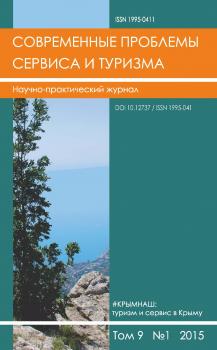The article investigates the forms and principles of involving intangible cultural heritage in tourism development thought the example of the Republic of Karelia. Various forms of intangible cultural heritage are presented according to the UNESCO Convention for the Safeguarding of the Intangible Cultural Heritage 2003. Forms of using of intangible cultural heritage in the framework of the various types of tourism organization are explored through the certain examples. The authors consider 4 conditions of legend’s involvement in the service process in the territory of tourism destination according to the «Scheherazade strategy» by Christian Salmon: (1) submission of natural and cultural heritage through the history / legend; (2) certain time of story / legend providing; (3)«message» of tourism destinations; (4) creation of information field on the Internet. The authors specify the 3rd point and formulated it as «formation of cultural anchor» that should «tie» specific local legend to places and objects located in the territory. The intangible cultural heritage involvement in the process of tourist services organization is considered by the example of the Karelian-Finnish epic poem «Kalevala», consisting of 50 runes (the Republic of Karelia). Experience of the «Kalevala» epic poem involvement in tourism is considered: tourism routes development, creating and adaptation of legends, development of event and adventure tourism. The possibility of implementing the updated «Scheherazade strategy» by the example of the epic poem «Kalevala» is investigated. As the research result, the authors propose an annual roleplaying game «Kalevala. Amazing adventure» as the new actual form of promotion «Kalevala» epic poem. This project was developed by students and lectures of Tourism Department of Petrozavodsk State University and included to the Small Deal Strategy of Kalevala region of the Republic of Karelia. This article was prepared as part of the scientific activities of the Strategic Development Program of Petrozavodsk State University for 2012–2016.
tourism economy, intangible cultural heritage, regional tourism, Kalevala epic poem, the Republic of Karelia
1. Afanasiev О.Е., Afanasieva А.V. The functional significance and place of tourist legends in creating attractive des- tination properties. Vestnik Assotsiatsii vuzov turizma i servisa [Universities for Tourism and Service Association Bulletin], 2015, vol.9, No.1, pp. 52-60. DOI:https://doi.org/10.12737/7943. (In Russ.).
2. Borisov I.V., Kolesnikova S.M. Monument rune singers Priladozhje. Regional Museum of Northern Ladoga. URL: http://museum-sortavala.ru/public/67-historimonument (Accessed on March 25, 2016). (In Russ.).
3. Grigoreva D.K. Foreign and Russian Experience of the Tourist Product Based on Conceptual Tourist and Recreational Attractors Methodical Features. Peterburgskij ekonomicheskij zhurnal [Petersburg Economic Journal], 2015, No.4, pp. 91-97. (In Russ.).
4. Kalevala. Karelian-Finnish epic / Retelling for children A. Lyubarskaya, drawings N. Kochergin. Petrozavodsk: Kare- lian book publishing house, 1967. 164 p. (In Russ.).
5. Kirilina V.M., Kolesnikova N.V., Kolesnikov N.G. The spahealth resort and touristic-recreational facilities of the region: the methodological aspects of their development. Voprosy kurortologii, fizioterapii i lechebnoy fizicheskoy kul’tury [Problems of Balneology, Physiotherapy, and Exercise Therapy], 2016, No.93(3), pp. 62-65. DOI: 10.17116/ kurort2016362-65. (In Russ.).
6. Krasavtseva N. «Kalevala» - meeting of epochs (interview with E.G. Karhu, PhD, the author of books and articles on the history of Finnish literature, folklore and literature of Karelia, winner of the State Prize of the Karelia ASSR). Newspaper «Lyceum», No.2 (February), 1995. (In Russ.).
7. Kolesnikov N.G., Shevchenko V.I., Kolesnikova N.V. On the development strategy of event tourism in a region. Aktual’nye zadachi sovremennoj nauki i obrazovanija: teoreticheskie i prikladnye aspekty [Actual problems of mod- ern science and education: theoretical and applied aspects]: Coll. scientific works based on the Intern. scientific- practical. conf. Smolensk: LLC «NOVALENSO», 2015, pp. 174-175. (In Russ.).
8. Kolesnikova N.V. The cognitive aspect of the tourist destination operating. Mezhdunarodnyj zhurnal prikladnyh i fundamental’nyh issledovanij [International journal of applied and fundamental research], 2015, No.10-1, pp. 174-175. (In Russ.).
9. Platonova N.A., Vapnyarskaya O.I. Construction of tourist attractiveness rating of the Russian Federation as a tool for the development of tourism differentiation. Transformacija nauchnyh paradigm i kommunikativnye praktiki v informacionnom sociume [Transformation of scientific paradigms and communication practices in the informa- tion society]: Coll. scientific works. Tomsk: National Research Tomsk Polytechnic University, 2012, pp. 108-111. (In Russ.).
10. Sevastyanova S.A., Maslennikova K.V. Attractors as the backbone tourism factors. Vestnik INZhEKONa. Serija: Ekonomika [Bulletin of Saint Petersburg State University of Engineering and Economics. Series: Economics], 2007, No.5(18), pp. 71-76. (In Russ.).
11. Elias L?nnrot: Life and work / E.G. Karhu; Rus. Acad. Sciences, Karel. Scientific Center, Institute of lang., lit. and his- tory. Petrozavodsk: Karelia, 1996. 237 p. (In Russ.).
12. Salmon K. Strategija ?eherezade. Beograd: Clio, 2011. 110 р.
13. Cadima Ribeiro J., Vareiro L., Remoaldo P.C. The hosttourist interaction in a World Heritage site: the case of Gui- maraes. China-USA Business Review, 2012, No.11(3), pp. 283-297.
14. Chen C.-F., Chen P.-C. Another look at the heritage tourism experience. Annals of Tourism Research, 2013, No.41, pp. 215-243. DOI:https://doi.org/10.1016/j.annals.2012.12.007.
15. Ritchie J., Hudson S. Understanding and meeting the challenges of consumer/tourist experience research. Interna- tional Journal of Tourism Research, 2009, No.11(2), pp. 111-126. DOI:https://doi.org/10.1002/jtr.721.
16. Yankholmes A.K.B., Akyeampong O.A. Tourists’ perceptions of heritage tourism development in Danish-Osu, Gha- na. International Journal of Tourism Research, 2010, No.12, pp. 603-616. DOI:https://doi.org/10.1002/jtr.781.





